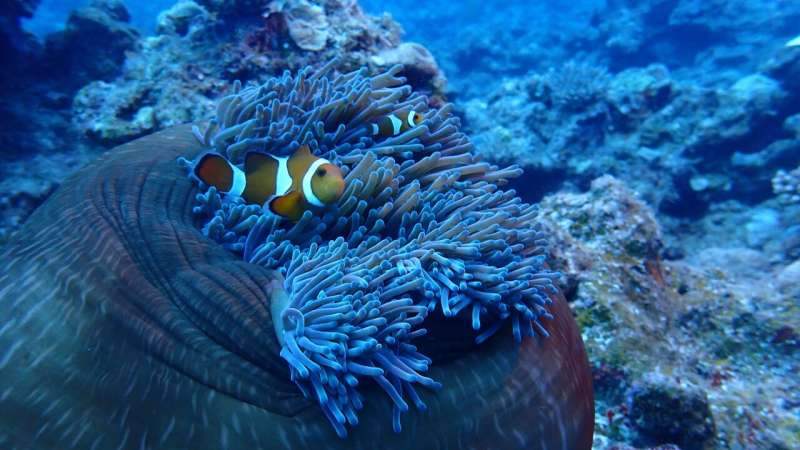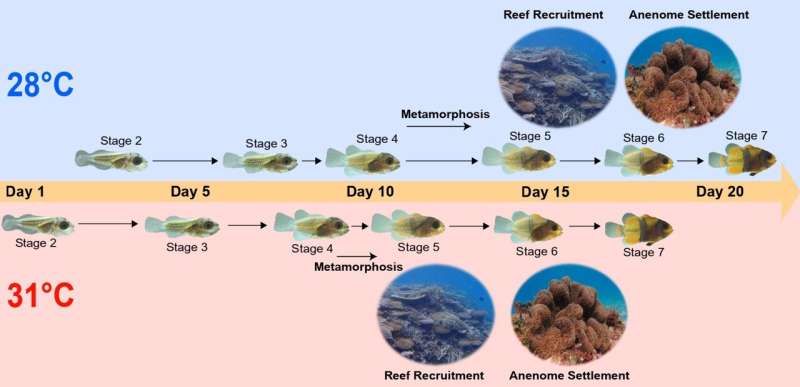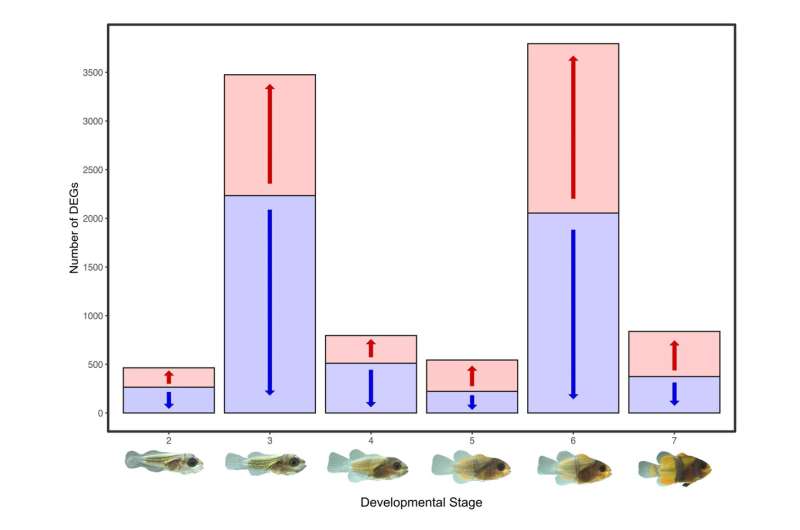This article has been reviewed according to Science X's editorial process and policies. Editors have highlighted the following attributes while ensuring the content's credibility:
fact-checked
peer-reviewed publication
trusted source
proofread
In hot water: Ocean warming impacts growth, metabolic rate and gene activity of newly hatched clownfish

Future ocean warming and marine heatwaves could impact the growth and development of clownfish during their earliest life stages, suggests a new study recently published in Science of The Total Environment.
A team of marine biologists from the Okinawa Institute of Science and Technology (OIST) reared the iconic coral reef fish in captivity at water temperatures of either 28°C or 31°C. Temperatures of 28°C represent current summer seawater temperatures in Okinawa, while temperatures of 31°C are reached during present-day marine heatwaves and are in line with the IPCC's predictions of 3°C warming by 2100.
The scientists studied the clownfish, Amphiprion ocellaris, for 20 days after hatching—a crucial period of development that has been understudied in respect to climate change. They found that in warmer temperatures, the larvae grew faster, had higher metabolic rates, and showed changes in the activity of certain genes.
"Most climate change studies have focused on adult or juvenile clownfish," said Billy Moore, first author and Ph.D. student in the OIST Marine Climate Change Unit, led by Professor Timothy Ravasi. "By focusing on the larval stages, we can get a more complete picture of how clownfish could be impacted by warming oceans and climate change."
During the first 20 days, clownfish pass through seven developmental stages, which in the wild are marked by distinct changes in location and behavior. Immediately after hatching, clownfish larvae are carried away from their home reef and into the open ocean. After roughly ten days, the clownfish reach stage four, which is when metamorphosis occurs and the fish start to develop their iconic orange-white colors. At around day 14, the clownfish, now in the fifth stage of development, find a new reef, and at stage six, seek out and settle into an anemone host.

In the study, the scientists imaged and measured the clownfish larvae over a 20-day period to determine their larval stage, and conducted trials to investigate metabolism. The team found that larvae reared at 31°C hit developmental milestones, such as metamorphosis, around two days earlier than those raised at 28°C. They also found that average metabolic rates for larvae were higher, likely driving the faster growth rates.
However, predicting how faster development could impact the survival of clownfish under future warming is very difficult.
Moore explained, "On one hand, the majority of clownfish do not survive the larval period due to predation, so shortening this time could increase their chances of survival and settlement. On the other hand, faster development may mean the clownfish disperse to new reefs less effectively, and the larvae may not be able to take in sufficient food to meet their increased energy demands."
The research team also investigated the activity of clownfish genes at each stage of development.
"Overall, we saw a really strong molecular response to warming," said Moore. "At every stage, many genes—more than 450—either increased or decreased in activity."

When the researchers looked into the functions of genes that had altered activity, they found that in clownfish raised at 31°C, genes associated with heat stress were more active from the earliest developmental stages.
In stage seven, the researchers also saw a decrease in the activity of genes involved in neurotransmission, which means that warmer temperatures could potentially lead to changes in clownfish behavior.
The researchers also found evidence to suggest that raising the clownfish in warmer temperatures changes the epigenome of the clownfish. The epigenome, Moore explained, refers to chemical alterations made across the genome, either directly to the DNA or to proteins associated with the DNA. These chemical changes, known as epigenetic modifications, affect how the DNA is packaged into chromosomes, which determines how active genes are.
In the clownfish raised at 28°C, genes involved in epigenetic modification were highly active in stages three and six. However, in clownfish raised at 31°C, the team did not observe the same activity, suggesting that these epigenetic modifications may be reduced at higher temperatures.
"We are now beginning experiments to study how the epigenome differs between clownfish raised at 31°C compared to 28°C. This could have really important implications as epigenetic changes laid down in the early stages of development impact how individuals respond to changes and stresses in the environment during their adult life," said Moore.
More information: Billy Moore et al, Clownfish larvae exhibit faster growth, higher metabolic rates and altered gene expression under future ocean warming, Science of The Total Environment (2023). DOI: 10.1016/j.scitotenv.2023.162296
Journal information: Science of the Total Environment
Provided by Okinawa Institute of Science and Technology


















